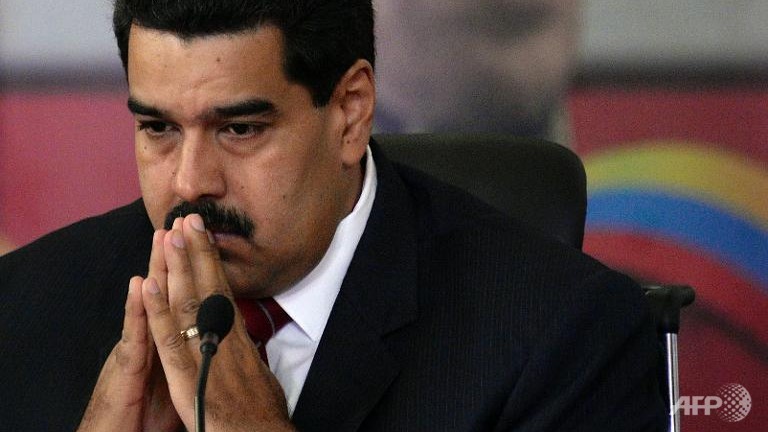Venezuela, US in diplomatic row over protests

Venezuelan President Nicolas Maduro. (AFP/Juan Barreto)
>>Three die in growing Venezuela protests
>>Two dead, 23 hurt in Venezuela protests
CARACAS: Venezuela gave three US diplomats 48 hours to leave the country Monday as Washington rejected as "baseless and false" accusations it was aiding protests against the government of President Nicolas Maduro.
Maduro is grappling with angry student protests that began in the interior of the oil-rich country and boiled over last week in street clashes in Caracas that left three dead.
Scores of protesters have been arrested and the government has issued a warrant for the arrest of a prominent opposition leader, Leopoldo Lopez, blaming him for the deaths and violence.
Foreign Minister Elias Jaua identified the Americans declared "persona non grata" as Breeann Marie McCusker, Jeffrey Gordon Elsen and Kristofer Lee Clark, all said to be second secretaries at the US embassy.
Jaua charged that the embassy had sent "operatives" to universities to train and finance youth organizations "through which the violence in Venezuela is promoted."
State Department spokeswoman Jen Psaki said Washington had not yet been formally notified of the Venezuelan action, and rejected the accusations made against the diplomats.
"The allegations that the United States is helping to organize protesters in Venezuela is baseless and false," she said.
The expulsions were first announced Sunday night in a speech by Maduro, who accused the diplomats of meeting with student protest leaders under the guise of offering them visas.
"Let them go conspire in Washington," he said.
Inflation, goods shortages at issue
Venezuelan officials have charged that student leaders received training in Mexico and the foreign ministry on Sunday accused Washington of seeking to "legitimize attempts to destabilize" the government.
The protests flared up on February 4 when students at a university in the western state of Tachira staged a demonstration against rampant crime after a student was raped.
Since then, as the protests spread to other cities, student grievances have expanded to demands that the government released jailed protesters.
They have also drawn attention to soaring inflation and shortages of many basic goods.
Protests in Caracas last week were the biggest against the government since Maduro took office in April, succeeding the late Hugo Chavez.
On Monday, opposition protesters marched peacefully to headquarters of the National Telecommunications Commission to protest censorship.
Lopez has called for a mass rally on Tuesday, as have supporters of Maduro, setting the stage for a fresh face-off.
Tense US-Venezuela ties
Venezuela's relations with Washington, long strained under Chavez, have remained sour and distrustful under Maduro, who has hewed to his predecessor's socialist policies.
In late September, Maduro kicked out three other US diplomats, including the charge d'affaires, Kelly Keiderling, on accusations of conspiring with government opponents. The two countries have had no ambassadors since 2010.
The latest diplomatic confrontation came after US Secretary of State John Kerry issued a statement Saturday expressing deep concern over the rising tensions and violence in Venezuela.
He called on the government in Caracas to release jailed prisoners and open "meaningful dialogue with the Venezuelan people."
Lopez, the opposition leader most closely identified with the protests, has managed to elude arrest, even while taunting the government over Twitter.
On Sunday, in a video linked to his Twitter account, he invited protesters to join him in a march on Tuesday to the justice ministry.
"If anyone has decided to illegally arrest and jail me, you know I will be there," he said. "I have nothing to fear; I have not done anything illegal."
The 42-year-old Lopez and two other opposition leaders -- deputy Maria Corina Machado and the mayor of metropolitan Caracas, Antonio Ledezma -- advocate using street protests to force Maduro from office.
The strategy, which they dub "the exit," is controversial even within the opposition.
Henrique Capriles, the opposition's candidate in Venezuela's last two presidential elections, has warned that conditions are not ripe for it despite public discontent over the country's deepening economic problems.
What the stars mean:
★ Poor ★ ★ Promising ★★★ Good ★★★★ Very good ★★★★★ Exceptional
Latest News
More News
- Foreign leaders extend congratulations to Party General Secretary To Lam (January 25, 2026 | 10:01)
- Russian President congratulates Vietnamese Party leader during phone talks (January 25, 2026 | 09:58)
- Worldwide congratulations underscore confidence in Vietnam’s 14th Party Congress (January 23, 2026 | 09:02)
- Political parties, organisations, int’l friends send congratulations to 14th National Party Congress (January 22, 2026 | 09:33)
- 14th National Party Congress: Japanese media highlight Vietnam’s growth targets (January 21, 2026 | 09:46)
- 14th National Party Congress: Driving force for Vietnam to continue renewal, innovation, breakthroughs (January 21, 2026 | 09:42)
- Vietnam remains spiritual support for progressive forces: Colombian party leader (January 21, 2026 | 08:00)
- Int'l media provides large coverage of 14th National Party Congress's first working day (January 20, 2026 | 09:09)
- Vietnamese firms win top honours at ASEAN Digital Awards (January 16, 2026 | 16:45)
- ASEAN Digital Ministers' Meeting opens in Hanoi (January 15, 2026 | 15:33)















 Mobile Version
Mobile Version